Outward Bound Trust - Transitions
Emily Rogers
Tuesday, May 10, 2016
Five-day residential that builds the communication and teamwork skills of children about to enter secondary school.

- Helps new secondary school entrants develop the personal, social and emotional skills needed for the challenges ahead, through a five-day residential in the Lake District, Scottish Highlands or Snowdonia
- The whole year group embarks on outdoor challenges to develop navigation, communication and teamwork skills, helping them build supportive friendships, overcome fears and increase confidence
- The outdoor learning programme is a powerful leveller and bonding experience for the diverse range of pupils entering secondary schools. Nearly 18,000 pupils have participated since 2006
ACTION
The Outward Bound Trust developed Transitions in response to demand from schools. The charity's head of education business development Natalie Harling says this stemmed from teachers' need to create "some common ground" for their diverse intake, and from teachers' recognition that pupils' swift settling, bonding and soft skill-development can help them hit the ground running in the classroom, boosting academic performance.
The course usually takes place in the first term of year 7, or "S1" in Scotland, after months of liaising with school staff, enabling the charity's education team to build understanding of the school and its new entrants. The charity may deliver presentations to engage pupils and reassure parents. Schools aim to include every year 7 or S1 pupil and around 70 per cent receive bursaries, funded through annual donations totalling around £2.5m.
A typical year group visiting one of the charity's six residential centres consists of 120 pupils divided into 10 groups of 12, each supported by a teacher and dedicated instructor. Each instructor develops a bespoke programme of activities to enable their group to meet the course learning outcomes, tailored to members' needs and abilities. No two schedules are the same.
The course starts with a traditional challenge known as "jog and dip". On arrival on Monday at 1pm, all 120 are taken on a jog around the grounds, before running together along the jetty and jumping into the lake. This icebreaking all-season tradition is designed to increase participants' confidence in their abilities and ease communication. "All barriers are broken down at that moment," explains Harling.
Each residential includes activities such as rock climbing and a mountain expedition, which can often begin by boat or canoe. Participants may spend the previous evening packing and preparing; studying maps, planning routes, and ensuring everyone has the necessary equipment. Harling says the expedition is designed to develop the transferable skills and attributes which will help participants navigate secondary school, such as personal responsibility, independent thinking, timekeeping and determination. "In a primary, everybody gives you everything you need and you don't often move between classes, she explains. "But at secondary, you're always moving between classes and you have to ensure you have all your own stuff for each class."
The course usually includes a local conservation project to boost participants' environmental awareness, such as clearing or repairing footpaths. Community living is another key programme feature. Groups must be together before going into dinner, developing responsibility, accountability and time-management, thanks to the pressure exerted on latecomers by their hungry peers. Evenings may involve group challenges, which in Harling's words "get pupils thinking about how they communicate and listen to those they're going to be working with for the next five years". This may include a "night line", which involves walking blindfolded as a team, all clutching a length of rope, negotiating obstacles such as fallen trees, developing mutual trust.
At key points throughout the day, the instructor reflects with the group on the learning outcomes achieved, discussing how to transfer these into school and home life. Harling says the activities give attending teachers a better understanding of what particular pupils are capable of, which they can remind them of at times when they're struggling at school. She explains: "When Johnny says he can't do his maths, the teacher may say: ‘do you remember when you were on that mountain and didn't think you could reach the top, but you did?'"
On the last morning, each group delivers a presentation about members' achievements and how they are going to use their new skills at school.
IMPACT
Transitions is among a range of outdoor learning courses offered by the Outward Bound Trust to schools and youth groups, collectively evaluated in the charity's 2014 Social Impact Report. The report shows 90 per cent of 246 participants surveyed after their course in 2012/13 stating they felt more confident in their ability to reach their goals and 89 per cent of 916 pupils saying they would be more likely to keep going when encountering difficulties.
Of 189 teachers responding to surveys between October 2010 and September 2013, 85 per cent observed improvements in pupils' attitude to learning one month after the course, with 92 per cent observing increased confidence, 60 per cent increased enthusiasm and 56 per cent increased motivation. Improved learning skills were observed by 80 per cent of teachers, with 59 per cent observing improved problem-solving and 41 per cent improved planning skills.
Of 187 teachers, 97 per cent observed improvements in pupils' relationships one month after the course, 82 per cent improved social skills and 95 per cent improved relationships with teachers. And of 191 teachers, 68 per cent observed rising classroom performance one month after the course, 71 per cent better listening ability and 66 per cent improved behaviour.
This practice example is part of CYP Now's special report on outdoor learning. Click here for more




